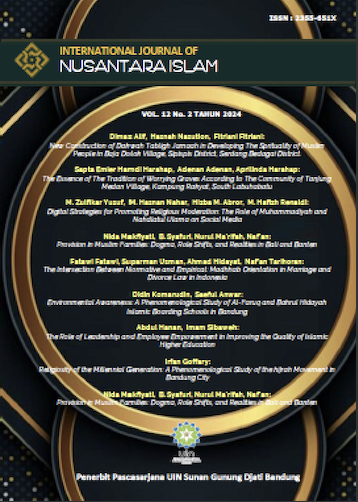Environmental Awareness: A Phenomenological Study of Al-Faruq and Bahrul Hidayah Islamic Boarding Schools in Bandung
Main Article Content
Abstract
Article Details
The Authors submitting a manuscript do so on the understanding that if accepted for publication, copyright of the article shall be assigned to International Journal of Nusantara Islam, Sunan Gunung Djati State Islamic University.
The copyright encompasses exclusive rights to reproduce and disseminate articles in all forms and media, including reprints, photographs, microfilm, and similar reproductions, as well as translations. Some or all of the contents of this journal can be stored in databases and transmitted in any form and media without the need for written permission from the International Journal of Nusantara Islam, Sunan Gunung Djati State Islamic University.
The Editors and the Advisory International Editorial Board make every effort to ensure that no wrong or misleading data, opinions or statements be published in the journal. In any way, the contents of the articles and advertisements published in the International Journal of Nusantara Islam (IJNI) are sole and exclusive responsibility of their respective authors and advertisers.
References
Abu Sayem, M. (2018). A Scientific World-View of Nature and Environmental Problems with a Special Concentration on Seyyed Hossein Nasr's Understanding of Environmental Sustainability: Seyyed Hossein Nasr's Understanding of Environmental Sustainability). Journal of Islam in Asia (E-ISSN: 2289-8077), 15(2). https://doi.org/10.31436/jia.v15i2.753
Abu Sayem, M. (2021). Eco-Religious Teachings and Environmental Sustainability: An Analysis of Seyyed Hossein Nasr's "Eco-Spirituality" in the Context of Bangladesh. Australian Journal of Islamic Studies, 6(3), 69-83. Retrieved from https://ajis.com.au/index.php/ajis/article/view/357
Anwar, S. (2020). The Concept of Perfect Man According to Muhammad Taqî Misbâh Yazdî. Jaqfi: Journal of Aqidah and Islamic Philosophy, 4(1). https://doi.org/10.15575/jaqfi.v4i1.9330
Anwar, S., & Rosyad, R. (2021). Thought and Application of Environmental Theology in Pesantren Cicalengka, Bandung Regency. Journal of Faith and Spirituality, 1(2). https://doi.org/10.15575/jis.v1i2.11793
Assya'bani, R. (2017). ECO-FUTUROLOGY: The thought of Ziauddin Sardar. Dialogia, 15(2). https://doi.org/10.21154/dialogia.v15i2.1193
B. Mathew Miles and Michael Huberman. (1992). Qualitative Data Analysis A Sourcebook of New Methods. Jakarta: UIP.
Clark, S. R. L. (2004). Pantheism. In Spirit of the Environment: Religion, Value and Environmental Concern. https://doi.org/10.4324/9780203696262-8
Cuddington, K. (2001). The "balance of nature" metaphor and equilibrium in population ecology. Biology and Philosophy, 16(4). https://doi.org/10.1023/A:1011910014900
Davary, B. (2012). Islam and Ecology: Southeast Asia, Adat, and the Essence of Keramat. ASIANetwork Exchange: A Journal for Asian Studies in the Liberal Arts, 20(1). https://doi.org/10.16995/ane.44
Faisal, S. (1995). Formats of Social Research. Jakarta: Raja Grafindo Persada.
Foltz, R. C., Denny, F. M., & Azizan, H. B. (2003). Islam and ecology: A bestowed trust. Bulletin. Ninth District Dental Society of the State of New York.
Foltz, R. (2005). Islam and Ecology Bibliography. The Forum on Religion and Ecology, Vol. 27.
Gardner, G. (2002). Invoking the spirit: Religion and spirituality in the quest for a sustainable world. Worldwatch Paper, (164).
Gloser, J. (2002). Miller, G.T.: Living in the Environment. Principles, Connections, and Solutions. Biologia Plantarum, 45(1). https://doi.org/10.1023/a:1015199330106
Jenkins, W. (2009). After Lynn White: Religious ethics and environmental problems. Journal of Religious Ethics, 37(2). https://doi.org/10.1111/j.1467-9795.2009.00387.x
Khitam, H. (2011). Manifestation of theological values in the ecological movement (case study in pesantren al amin sukabumi and pesantren daarul ulum lido bogor). Thesis.
Maftukhin, M. (2016). Environmental Theology Perspective of Seyeed Hossein Nasr. Journal of Research Dynamics, 16(2). https://doi.org/10.21274/dinamika.2016.16.2.337-352
Mahzumi, F. (2018). Ecotheological Reflection of KH. KPP. Noer Nasroh Hadiningrat at Walisongo Islamic Boarding School in Tuban. ISLAMICA Islamic Studies, 12(2).
Mangunjaya, F. (2014). Ecopesantren: How to Design an Environmentally Friendly Pesantren? Jakarta: Yayasan Obor Indonesia.
Mangunjaya, F. M., Heriyanto, H., & Gholami, R. (2007). Planting Before the Apocalypse (F. M. Mangunjaya, H. Heriyanto, & R. Gholami, Eds.). Jakarta: CII & ICAS.
MILLER, G. T., & SPOOLMAN, J. S. E. (2007). Living in the environment: principles, connections, and solutions. In World.
Moleong, L. J. (1998). Qualitative Research Methodology. Bandung: Teenage Workshop.
Muhammad, A. S. (Ed.). (2006). Fiqh of the Environment: Fiqh al-Bi'ah. Jakarta: Concervation International Indonesia.
Nafisah, N. (2018). ENVIRONMENTAL THEOLOGY IN ISLAM AND CHRISTIANITY (A study of the thoughts of Mujiyono Abdillah and Robert P. Borrong). Analysis: Journal of Social Science and Religion, 3(1). https://doi.org/10.18784/analisa.v3i1.605
Nasr, Sayyed Hosein. (1996). Religion and the Order of Nature. New York: Oxford University Press.
Nasr, Sayyed Hosein. (2005). Between God, Man and Nature: A Philosophical and Religious Bridge to the Spiritual Summit. Yogyakarta: Ircisod.
Nasr, Seyyed Hossein. (1981). Knowledge and the Sacred. Edinburg: Edinburgh University Press.
Nasr, Seyyed Hossein. (1983). Islam and the Plight of Modern Man. Bandung: Pustaka.
Nasr, Seyyed Hossein. (2004). Intelligence and spirituality of religions. Jakarta: Initiation Press.
Nasr, Seyyed Hossein. (2013). Islam and the Plight of Modern Man. In Tradition and Modernity: Christian and Muslim Perspectives (Vol. 2).
Quddus, A. (2017). Islamic Ecotheology: Constructive Theology to Overcome Environmental Crisis. Ulumuna, 16(2). https://doi.org/10.20414/ujis.v16i2.181
Sayem, M. A. (2019). Seyyed Hossein Nasr's Works on Environmental Issues. Islamic Studies, 58(3).
Schuler, B. (2014). Environmental and Climate Change in South and Southeast Asia. In Environmental and Climate Change in South and Southeast Asia. https://doi.org/10.1163/9789004273221
Tampubolon, Y. H. (2020). A Critical Examination of Lynn White's Environmental Ethics. TE DEUM (Journal of Theology and Ministry Development), 9(2). https://doi.org/10.51828/td.v9i2.13
Tolchah, M. (2016). THE DISASTER THEOLOGY OF THE PESANTREN. KARSA: Journal of Islamic Social and Culture, 23(2), 307. https://doi.org/10.19105/karsa.v23i2.729
White, L. (1967). The Historical Roots of Our Ecological Crisis. Science, 155(3737), 1203-1207.
Yaakob, Z. I., & Moris, Z. (2012). Human Rights in Dealing with the Environmental Crisis: Seyyed Hossein Nasr's Perspective. ", International Journal of Islamic Thought, 2.
Ziauddin Sardar. (1989). Science Technology and Development in Islam (R. Astuti, Trans.). Bandung: Pustaka.
Ziauddin Sardar. (1996). The Challenge of the Islamic World in the 21st Century (A. Priyono & I. Hasan, Trans.). Bandung: Mizan.

